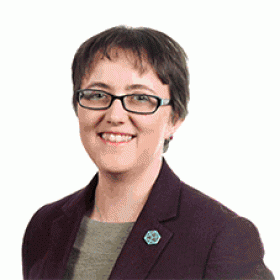Professor Tara Spires-Jones appointed new President-Elect of the British Neuroscience Association

Congratulations to Professor Tara Spires-Jones (Centre for Discovery Brain Sciences, and UK Dementia Research Institute at Edinburgh) on being appointed the new President-elect of the British Neuroscience Association (BNA).
Tara's research focuses on the mechanisms and reversibility of neurodegeneration in Alzheimer’s disease, other degenerative brain diseases, and ageing. She is also passionate about communicating scientific findings to the public and policy makers, increasing the rigour and reproducibility in translational neuroscience, promoting inclusivity and diversity in science, and supporting career development of neuroscientists. She worked on these fronts as one of the founding Scholars of the FENS-Kavli Network of Excellence from 2014-2018. She is founding editor of the translational neuroscience journal Brain Communications, is a member of the Board of Reviewing Editors at Science, Section Editor at the European Journal of Neuroscience, and is on the editorial boards of Neuron and Cell Reports.
With over 2,000 members, the BNA is the UK's largest organisation representing and promoting neuroscience and neuroscientists. Nominated by members of the BNA, the position of President is a prestigious role and Tara will follow previous holders including Edinburgh researchers Professor John Kelly (1986-1990) and Professor Richard Morris (1991-1994), Nobel prize winner Professor John O'Keefe (1983-1986), Dame Professor Nancy Rothwell (2000-2004), and current outgoing President Professor Annette Dolphin. Tara will support the incoming President, Professor Rik Henson (Cambridge University), and assume the role of President at the BNA Festival of Neuroscience in April 2023. Tara will become the 4th female President of the BNA.
Tara Spires-Jones' BNA manifesto
I am honoured to be chosen as President-Elect of BNA and very much look forward to working with everyone in the Association to represent and promote neuroscience and neuroscientists. As well as supporting the excellent policies and programmes already in place at BNA, there are a few avenues I would like to pursue in my time as President.
Building capacity including a more diverse, inclusive neuroscience workforce is something I would like to continue to promote. We have a huge challenge in our field to understand how the nervous system works and how to fix it when things go wrong to help the more than 1 billion people worldwide living with brain disorders. To address this challenge, we need the best minds from all walks of life to join us. I’m thrilled to see the new BNA Scholars programme to support students from underrepresented ethnic groups to thrive in neuroscience, to see that BNA was an early signatory of the Alba declaration on equity and inclusion, and to see the BNA-carer grants to support childcare expenses for people attending the festival. I hope to bring some of the ideas I’ve learned working with our local University of Edinburgh Staff Pride Network and Edinburgh Race Equality Network to build on this and continue to make neuroscience and BNA a welcoming place for people of all races and genders, and for people who identify as part of LGBT+ communities.
I would also like to continue the excellent work BNA is doing to promote credibility in neuroscience. The BNA credibility prizes to promote transparent, rigorous science, excellent training courses, and the pre-registration posters at the Festival are already making a difference on this front. During his time as President, Prof Henson plans to build on this and I will be sure to keep up the momentum on this important front for our community.
Finally, I would like to help BNA and our members promote engagement with neuroscientists in academia and industry worldwide, and with the wider public. As we emerge from the global pandemic and the after-effects of Brexit, it will be very important for BNA to emphasize to policy makers and funders that neuroscience research is of vital importance to our society and that international collaborations are key to our success.
As an alumnus and founding member of the FENS-Kavli Network of Excellence, I will bring experience of building an international neuroscience network with a track record of mentoring neuroscientists, supporting diversity in neuroscience, and influencing science policy. By engaging with the public, we can encourage people to maintain their brain health, participate in neuroscience research, and put pressure on their representatives to keep us funded. Continuing BNA's efforts to promote engagement between academic and industry colleagues will help translate the outstanding fundamental neuroscience discoveries being made Britain into treatments to help people living with brain disorders.

